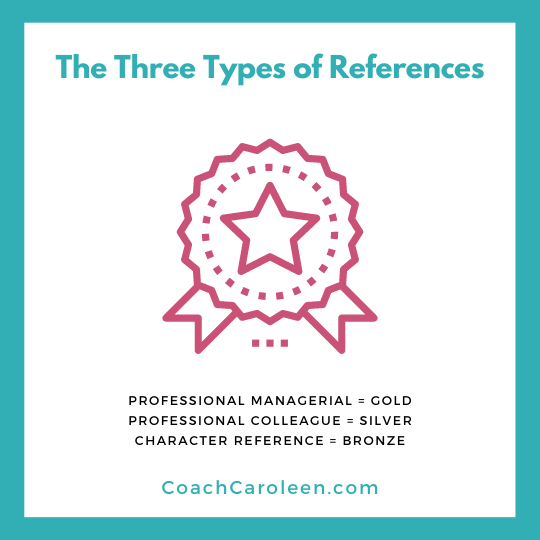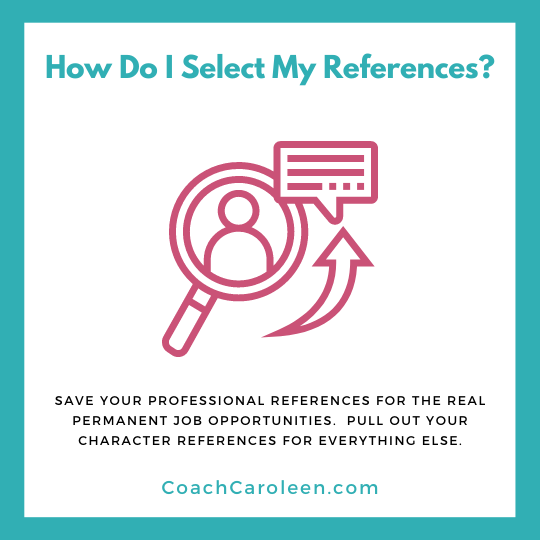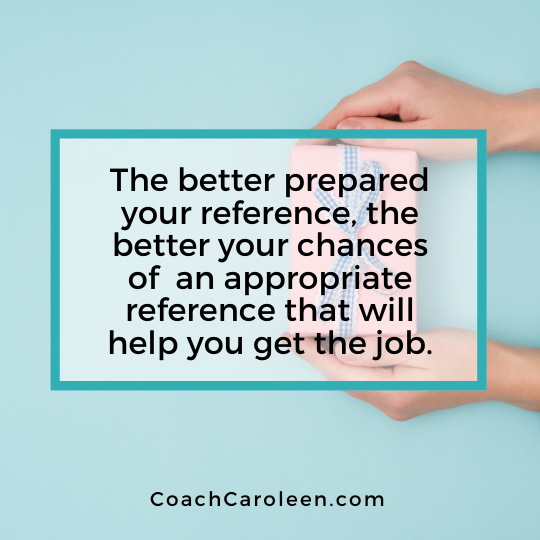Additional menu
What if a recruiter wants references right away even before the interview or job offer?
When is the right time to share your references?
What kind of references should you provide?
What if you don’t want to burn bridges with your references by having them called too much?
I had all the same questions when I started my job search. I’d been in the same industry about 15 years with the same boss that whole time. I didn’t want him to field every phone call while I was out job hunting.
When I was transitioning to banking, I worked mostly with third-party recruiters that worked for staffing agencies. To get my foot in the door of banking, I stood a better chance of getting there on a short-term contract. These contracts tend to close quickly which suited me because I wanted to change industries fast. Plus, the hiring managers are a bit more forgiving in their selection since they just need someone fast.
Think about it like you’re moving to a new city and looking for a place to live. You’ll want to be in a decent and safe area but you just need something quick and temporary. You’re not going to be as concerned about signing a 6-month lease as you are with buying your forever home.
It’s the same with contract workers. Hiring managers won’t be as picky but they still want someone that’s a decent fit. I knew I stood a better chance of making the cut with my “non-traditional” background for a contractor role.
The problem I ran into was these recruiters were so pushy about references. I remember the first few times they demanded my references or else they wouldn’t work with me. Whaaaaat? Eventually, I learned to push back on the recruiters. The funny thing was the recruiters that were the pushiest about getting references upfront never found me the job. I think they were just checking boxes and I’m not ready to waste my references’ time on that. The more you understand about the reference process, the better off you’ll be in the job search.
How do I select my references?
I realized that the third-party recruiters for short-term contracts just wanted me to pass their “sniff test” when they were asking for references. In the same way that the hiring managers aren’t quite as picky about temporary contract workers, these recruiters are similar.
If you’re currently employed, I highly discourage that you use anyone from your current employment unless you’re 100% sure you’re leaving.
Save your professional references for the real permanent job opportunities. Pull out your character references for everything else.

Professional Managerial References (Gold)
These are your Gold Medal references. These are the management folks in your career history. They may have been your former manager, supervisor, or project lead in a real-world work setting. They have direct knowledge from a managerial perspective of your work experience, work ethic, and how well you performed.
For me, I’d had the same boss for about 15 years. The only time I ever used him as a reference was after I got the job offer. I knew this was a done deal. I knew I’d be taking the job. That’s when I would ask him to serve as a professional reference for my next manager. This is really when the reference mattered.
Guard these references tightly and use them sparingly. Save these references for the last moment after you’ve had the interview and are about to get the job offer. These are your most precious references.
Professional Colleague References (Silver)
These are your Silver Medal references. These are your peers and colleagues from prior jobs. They can also speak to your work experience and ethic but weren’t in a supervisory role over your duties.
You can use these references more often but you still want to minimize how often they get called. Depending on how close your personal relationship is, be careful in how often you call on your former peers to be your reference.
Character References (Bronze)
Interestingly, your bronze medal references are probably the ones you will use the most. These are your character references and people that you have deep personal relationships. These are your friends that don’t mind having recruiters call them repeatedly with the same questions.
These were my favorite kinds of references. During my career transition, I took coding classes at night to level up on some technical skills. My coding teacher and I became close friends. He had a strong career in banking and knew the world of third-party recruiters well.
Another reference I used was the PTA president of my daughter’s school. I had done an extensive rebuild of the school PTA website under her leadership. She could speak to my character and work ethic even though it was for volunteer work. She also was also quite familiar with working with recruiters.
These are also the people in your life that you can do the most prep and make sure they understand what you’re looking for in your next career move. They will keep in close communication with you when someone calls and asks for a reference which keeps you in the loop about your job search. I also liked to use references that are familiar with working with recruiters. They know the drill which really helps.

When should I reveal my references?
The short answer is that you should wait until the very last possible moment before sharing your references. If you’re actively job searching, you should have several irons in the fire. You don’t want every recruiter bugging your references constantly. Save your references until the recruiter absolutely needs them.
Here are a few scripts to help dealing with reference requests:
Once we have a job offer on the table, then I’ll be happy to turn over my references. Until that time, it’s not professional for me to constantly bombard my professional references with requests unless I’m sure we have a viable offer on the way.
Save your Gold Medal references for last!
If you can not move forward without speaking to my references, I’ll be happy to provide two character references at this time.
Pull out your silver or bronze medal references for this and let them know it’s coming.
As a professional courtesy, I’ll want my references to be prepared for your call. What information will you be requesting from my references?
It’s ok for you to ask this. Then of course, make sure your references are prepped.

How should I prepare my references?
You should prepare your references as much as possible. Make sure that these are people you know well and trust that they will give you a positive reference. Although you can never confirm what they say about you, use your best judgement in selecting your references carefully. If you’re not comfortable asking someone to take the time to review your resume and understand your job goals, then you shouldn’t ask them to be your reference. Their lack of interest in supporting you could jeopardize your job.
Imagine if this reference is reluctant to help. Imagine if they don’t want to answer the phone when the recruiter calls or bother to call the recruiter back. Imagine if your reference bad mouths you and causes the recruiter to lose faith in you. Select your references carefully and make sure they’re willing to support you in a positive way during your job search.

Share your career goals
No matter what level of reference this is – gold, silver, or bronze – you should be communicating with them directly. Although it sounds like a lot (because it is!), your references should have the following information anytime you ask them to do this favor for you. The better prepared your reference, the better your chances of an appropriate reference that will help you get the job.
Share the job description
Share a copy of your current resume
This way, your reference has an exact copy of your dates worked and job titles. This ensures that your references’ information about your work history lines up exactly with what the recruiter has on file.
Summary
In summary, select your references carefully in the job search. Don’t burn them out and waste them too early and too often with the wrong opportunities. Save your Gold Medal Professional References for once you’ve gotten the job offer or are absolutely sure it’s coming. Otherwise, use your Silver Medal Colleagues or Bronze Character References instead. Don’t reveal your references until the last possible moment. These people are doing you a favor and you don’t want to abuse that.
No matter what level of reference, make sure they are fully prepped and aware that they’ll be getting a call. Make sure your reference knows your career goals and has the resume and job description. The better prepared your reference, the better your chances of an appropriate reference that will help you get the job.
